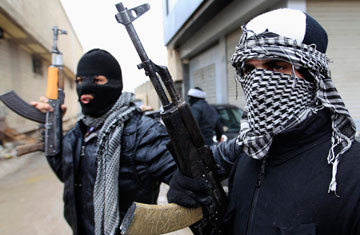
Syrian soldiers, who have defected to join the Free Syrian Army, hold up their rifles as they secure a street in a suburb of Damascus on Jan. 27, 2012
While the civil war in Syria has been, for the most part, fearsomely asymmetrical to the regime's advantage, the government has been hit by shadowy elements, including the assassination of a general in Damascus on Saturday and bombings in the commercial center of Aleppo a day before. Still, the loosely organized antiregime forces that go under the name Free Syrian Army are struggling to forge a united front — or even a set of priorities and tactics. TIME's Rania Abouzeid sat in a meeting of rebels from northern Syria in Turkey as they tried to plot out a campaign, even as the regime is believed to be mining the border and massing troops in the area.
The former captain quickly peeled off his dripping wet black jacket, took off his shoes and made his way toward the sobya — a stove that acts as a heater — a few steps in from the door to dry off. His deputy, a sergeant, hung up his military jacket, the only part of his uniform he still wore, before removing his drenched socks and huddling near the stove. The two defectors had just crossed the mountainous frontier from Syria to Turkey to attend the meeting that was about to take place. "The device you made doesn't work," the captain told Abu Hikmat, a bearded, shaggy-haired man in a black ivy cap who, like most of the other men in the room, was seated on a thin mattress on the floor. "What? Really? Let's talk later," Abu Hikmat says.
There was more pressing business on Thursday night in this safe house in a village not far from the Turkish border with Syria. For the next three hours, the 11 men in the small, smoky room discussed tactics and strategies to "liberate" the northern Syrian region of Idlib. Peaceful protests were not part of their plans.
TIME is withholding the real names of the participants, who were largely from the battered northern Syrian town of Jisr al-Shughour, to protect them. There were four defectors from the Syrian army; three representatives of Syrian refugees from Yayladagi camp (the largest of several camps in Turkey); a few more Syrian refugees who weren't staying in the camps but were responsible for smuggling supplies including food, phones and light weapons to defectors on the other side of the border; and a self-described Syrian military strategist living in exile that we'll call "the doctor," because that's how the men in the room addressed him.
Abu Hikmat, a civilian "revolutionary commander" who describes himself as a "bridge that supplies pass over," opens the discussion. "We don't have ammunition," he says. "We need money for supplies."
"The opposition that has money is the Muslim Brotherhood, [radical Saudi-based Sunni cleric Sheik Adnan] Arour, and the Free Syrian Army [FSA] command. Forget about them, they won't help you," the doctor says. "The Free Syrian Army in Turkey is a game, a facade to tell the world that that there is a command. I am here to tell you that nobody on the outside says you are militias, everybody knows that [Turkey-based FSA commander] Riad al-Asaad is controlled by the Turks, the Syrian National Council [the de facto opposition group] represents itself. The revolution inside must unite, and every area should set up an operations command center. I'm here to help you with that."
The men listen intently as the doctor, a stocky man with a bushy white beard, thick gray hair and a bulbous nose, begins to outline his plan. A metal teapot bubbles on the sobya. A dozen small, hourglass teacups are filled and passed around. The doctor lights up his pipe. "We must liberate Idlib because it's easier, the number of security forces in Idlib is less than elsewhere," he says.
"You're wrong, doctor," says the captain, a handsome, intense man who, despite his relatively low rank, is clearly a leader. "There are 1,500 soldiers in Khirbet al-Jouz alone," he says, a village just across the border from the Turkish village of Guvecci.
"What I'm saying," the doctor continues, "is that liberating the governorate of Idlib is better than liberating a village like Khirbet al-Jouz. We need to make big strategic gains. Europeans won't send their children here to die for us. We must liberate an area. If a group needs ammunition, what can it do?" he asks rhetorically. "If we have 10 guns, we'll sell two, buy ammunition and overrun a checkpoint. Don't wait for London or Paris. We are men, we are brave, the only thing we lack is organization. There are at least 1,000 revolutionaries in Idlib."
"Are they all with us?" asks Jihad, a mustachioed refugee staying in Yayladagi.
"Most of them," replies the captain.
